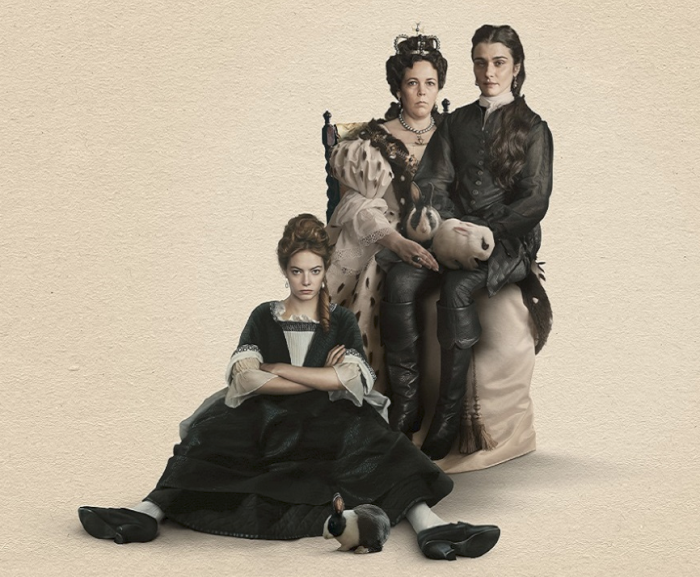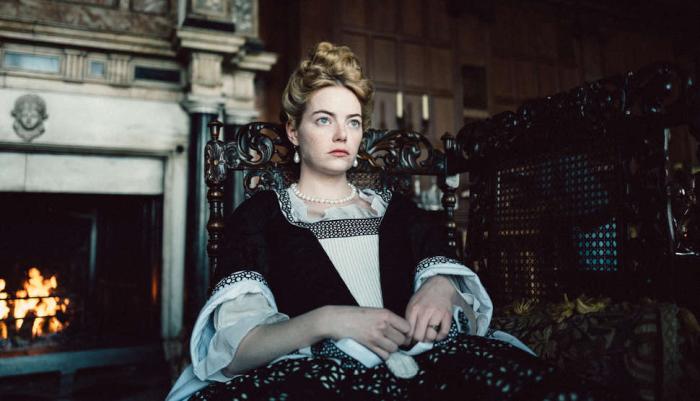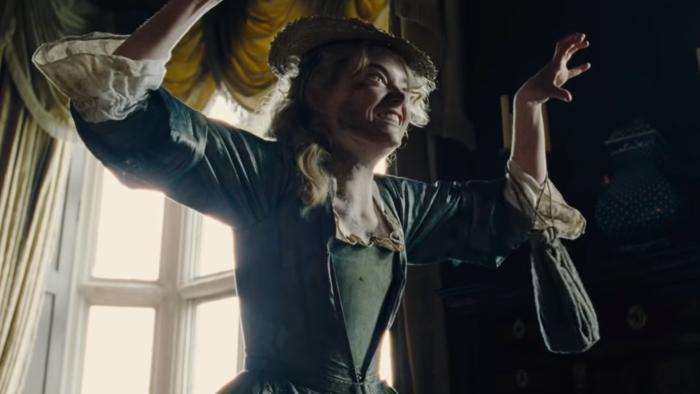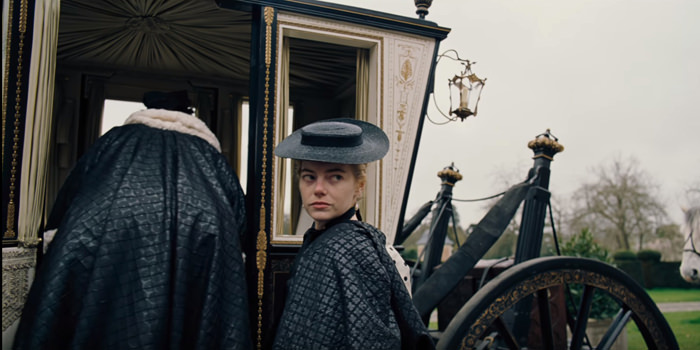

Review: 'The Favourite' is a Near Perfect Feminist Comedy Featuring Emma Stone's Best Performance
By Petr Navovy | Film | January 4, 2019 |
By Petr Navovy | Film | January 4, 2019 |

It’s 1708 and Britain is at war with France. Queen Anne (Olivia Colman) sits on the throne but does not rule. Distracted by grief, idleness, and periodic bouts of gout, she treats her opulent palace as a macabre playground, racing ducks, caring for seventeen rabbits that represent her failed pregnancies, and stuffing her face with cake. The latter makes her vomit almost immediately each time. She knows this will happen but she does it anyway. Servants lean in with an ornate goblet when she needs to evacuate, retreating deferentially when she is done.
Though Anne is the sovereign of the land, the actual agency of rule has been largely and unofficially devolved to her close confidante and secret lover, Lady Sarah Churchill (Rachel Weisz), the Duchess of Marlborough. Sarah is strong-willed, acerbically witty, and she acts as an intermediary between the Queen and her Parliament, represented on one political side by the foppish Robert Harley (Nicolas Hoult, doing his best work outside of Fury Road) and on the other by Sidney Godolphin (The Thick of It’s James Smith). Churchill is far from a Grima Wormtongue figure, but she does hold significant sway over policy thanks to not just having the Queen’s ear, but also often acting as her mouth—a situation that has not gone unnoticed by Harley and Godolphin, who each seek to prosecute the war with the French in a different way, and who need the Queen’s seal of approval to do so.
Into this court of intrigue arrives Abigail Hill (Emma Stone), a fallen aristocrat and cousin of Churchill. Hill is first seen pulling up to the Queen’s palace in a small, crowded carriage, sat opposite a quite handsome man who shortly proceeds to whip his private parts out and masturbate while maintaining eye contact with her. The way this little introductory scene is shot leaves no doubt that though the situation is mortifying for Hill, the movie is on her side during it. The man is portrayed as pathetic and alienating. This attitude is emblematic of the movie as a whole, which has its female protagonists go through physical trials, emotional breakdowns, and terribly embarrassing moments—many of which it displays in unflinching detail—all the while never looking down on them or treating them with contempt. We get to know these women intimately well over the course of the film’s two hours, and by the end, we empathise deeply with all three. We also feel a broad sweep of additional emotions in relation to them: Disgust, pity, rage, fear. And it makes us laugh. A lot. It makes us laugh with them as well as at them, as we would with real acquaintances. The whole movie is a highlight reel of line deliveries. While Abigail is the most likely candidate for being our core protagonist, the truth is that the wonderful script devotes a lot of time and space to developing all three women, and it is a very rich experience for doing so.
Hill has come to ask her cousin for a job, any job, at court. She comes across first as a rather sweet and unassuming character, humbled by her family’s misfortunes and the indignities she has had to suffer as a result—her gambling-addict father selling her off to settle a debt to a horrible, lecherous merchant being just one example. It is not long, however, until Hill reveals a craftier, more calculating side. In one early, telling exchange, we learn that she managed to ameliorate the pain of her time with the merchant by convincing him that a woman’s period makes her bleed for all but a few days each month, horrifying him into staying away from her. This is not a dull-witted woman. The Favourite’s main narrative thrust concerns Hill using her wiles to try to escape the lowly and degrading scullery work she starts out with and to ingratiate herself into the very highest echelons of Anne’s court, seeking finally to depose even Marlborough herself and to take her place. Churchill, herself a profoundly adept player of these games, does not, naturally, intend to go without a fight. Crucially, the film does not paint Hill as a villain. It is not interested in anything as two dimensional as that. That’s not to say she does not do some villainous things, but the movie makes us understand why she might do them, constantly reminding us of the deeply male-centric society in which she lives. A Queen may sit on the throne and another woman may wield incredible power through her, but there is a vast gulf between individual agency and systemic power. Individual women may well ascend to positions of power, but—then, as now—the structures in place remain staunchly patriarchal, and to secure your place in the scheme of things if you are not born the ‘correct’ way can be a desperate struggle indeed. The Favourite doesn’t demean the women by pretending that they are saints.
The Favourite is the third English language movie from Greek director Yorgos Lanthimos—the man who swept onto the world stage with the striking Oscar-nominated Dogtooth in 2009—and it is the first feature that he has directed but not had a hand in writing himself. First-time screenwriter Deborah Davis wrote the initial script back in 1998, basing the actual history that infuses the story on parts of the Duke of Marlborough descendant Winston Churchill’s (yes, that one) autobiography, as well as Sarah’s own memoirs. In an interview, Davis described the long journey of the script to screen:
As a historian who studied history at university and someone who had a lifelong history, I knew nothing about Queen Anne and I knew nothing about this relationship. So, I set myself the task of finding out about Sarah and Queen Anne and very quickly stumbled on the story about women in power and a female triangle.[…]
I wrote the first draft in 1998 and I had no experience in scriptwriting. I took myself to night school to learn. I took that first draft to [producer] Ceci Dempsey and she was very interested in it, but at the time she wasn’t ready to take it on. She said to always keep in touch with her. […] I went back to Ceci in the early 2000’s and she said she was ready to take it on. She had never ever wavered in her support and passion for this project. In 2007, she took it to Lee Magiday who was head of film. I carried on writing drafts for them. In 2010, Lee had this extraordinary [sic] of attaching an avant-garde director to this British costume drama and that was Yorgos and the rest, as they say, is his-tory.
Perhaps it is because The Favourite was written by someone other than Lanthimos and his usual co-writer Efthymis Filippou that it feels like a subtle shift in course for the director. There is no mistaking his direction or darkly comic, bleakly provocative vision, but in contrast to his earlier works, there is more lyricism here, a bubblier energy. Lanthimos’ 2015 feature The Lobster is one of the better movies of the 2010s. The dialogue and behaviour in it is deliberately stilted and awkwardly rhythmic. That kind of delivery feeds into the discomfort that the director likes to suffuse his movies with. In The Favourite, that awkwardness is still very much in evidence, yet it feels far more playful, all the while without losing its cutting edge. It is at once an insightful account of what women will do to survive and a bawdy lesbian relationship comedy. It approaches the latter in a refreshingly frank manner, not using it for a voyeuristic thrill or a heavy-handed morality play but instead a matter-of-fact, almost background, component of the story. According to IndieWire:
My instinct from the beginning was that I didn’t want this to become an issue in the film, for us, like we’re trying to make a point out of it […] I didn’t even want the characters in the film to be making an issue of it. I just wanted to deal with these three women as human beings. It didn’t matter that there were relationships of the same gender. I stopped thinking about that very early on in the process.
Lanthimos has also said of the film:
Because of the prevalent male gaze in cinema, women are portrayed as housewives, girlfriends… Our small contribution is we’re just trying to show them as complex and wonderful and horrific as they are, like other human beings.
Indeed that attitude is one of the most refreshing things about The Favourite. And it is an absolute treat to see three actresses at the very top of their game bringing this vision to life. The Favourite is a movie that is built upon the performance of its central trio, and to try to rank Colman, Weisz, and Stone would be reductive and pointless. Colman is spellbinding as Anne, playing her at first as a somewhat broad caricature of a weak-minded simpleton before slowly peeling back the layers to reveal an incredibly complex character powered by a sea of roiling emotion, both elevated by her near omnipotence and suffocated by it. Colman has said that playing Anne was a joy, because ‘she sort of feels everything.’ Weisz is an actor whom I had always respected but whose performances never really spoke to me. That is until I saw her in the aforementioned The Lobster, in which she displayed pitch-perfect comedic timing and generous amounts of pathos. Here she takes that even further. She is gifted with some of the movie’s best lines and she absolutely relishes delivering them. And as Abigail, Emma Stone gives what is quite simply the performance of her career. Weaponising that easygoing charm and those huge expressive eyes of hers, Stone manages to hoodwink everyone, both onscreen and off. It’s a dynamite performance, all the more so for—to this reviewer’s mind at least—basically having come out of nowhere. I simply didn’t have an idea that Stone could be this good.



Lanthimos has said of The Favourite that it’s ‘a bit more straightforward than […] my other films,’ and while that is undeniably true, it does not detract from the experience at all. The director’s work sometimes reminds me a little bit of that other contemporary provocateur, Sweden’s Ruben Östlund. Östlund’s movies—like The Square and Force Majeure—share some DNA with Lanthimos’ in that they prod and pry into societal assumptions, and interrogate our unspoken hypocrisies, all the while being shot in often cool, clinical ways. With The Favourite, Lanthimos has traded the cool and clinical for something broader and naughtier, but he has not lost his edge. The Favourite is near-perfectly balanced, gorgeously and deliriously shot (fisheye lenses aplenty!), and excellently scored. It is a hilarious historical lesbian sex and power drama with wonderfully anachronistic touches, dance sequences, and a protracted pratfall of a makeout session set in a forest, and if you can you should absolutely treat yourself to drinking it all in from a very big screen.
And, also, prepare yourself for some of the finest uses of the ‘c-word’ that you will ever hear. It’s that kind of movie.
← Netflix's 'Pine Gap' Is a Spy Thriller For People Who Don't Like Spy Thrillers | Spoilers: How 'Escape Room' Is Ruined By Its Ending →
More Like This
Kyle Mooney's Horror-Comedy 'Y2K' Goes Too Hard on Kyle Mooney's Sense of Humor
'Imaginary' Almost Sucks
Box Office Report: Kung Fu Sandworms
The 2024 Oscars Were Great Right Up Until the End
Kristen Stewart's 'Love Lies Bleeding' Is Gonna Kick Your Ass And Make You Beg For More

What’s Old Is New Again: Old Hollywood Glamour Glitters at the 2024 Oscars
Al Pacino Presents Best Picture Oscar, Confuses Everyone
The Dangerous Lie Of 'TradWives'
A Legendary Horror Franchise Is Headed To Television
'The Mandalorian' Season 4 Is Probably Not Happening
Halle Bailey On Why She Chose To Keep Her Pregnancy Private
More Like This
Kyle Mooney's Horror-Comedy 'Y2K' Goes Too Hard on Kyle Mooney's Sense of Humor
'Imaginary' Almost Sucks
Box Office Report: Kung Fu Sandworms
The 2024 Oscars Were Great Right Up Until the End
Kristen Stewart's 'Love Lies Bleeding' Is Gonna Kick Your Ass And Make You Beg For More
Reviews